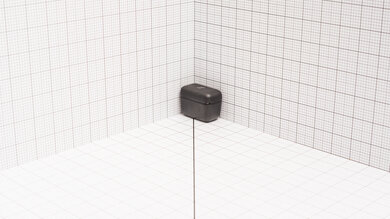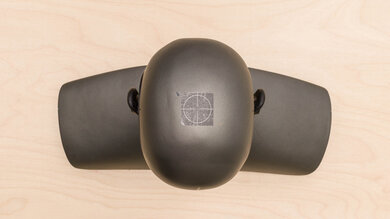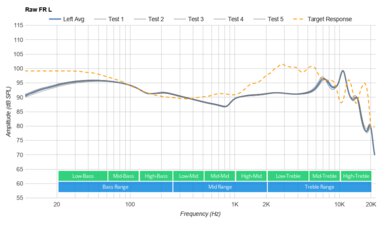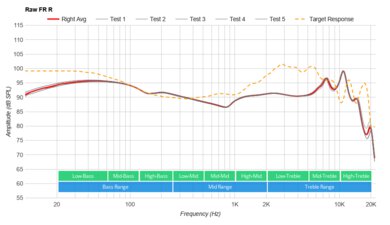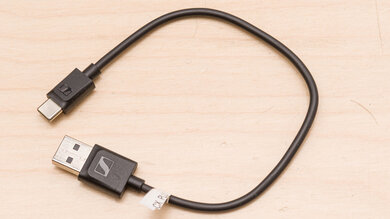The Sennheiser CX Plus True Wireless are the upgraded variant of the Sennheiser CX True Wireless. They have an improved continuous battery life, support aptX Adaptive codec, and have an active noise cancelling (ANC) system. However, aptX Adaptive is only available on some devices, and their ANC only does an okay job of blocking out ambient sound, so it may not be enough for noisy commutes. They also have a warm and bass-heavy default sound profile, although if you prefer a different sound, their companion app has a graphic EQ and presets so that you can customize them to your liking.
Our Verdict
The Sennheiser CX Plus are alright for neutral sound. Out of the box, they have a warm and bass-heavy sound profile that delivers extra boom to your mixes. However, vocals and lead instruments are dark and veiled in comparison, which may not be ideal if you listen to content like pop or podcasts. Luckily, their companion app offers a graphic EQ and presets so you can adjust their sound to your liking.
- Graphic EQ and presets available via companion app.
- Terrible passive soundstage.
The Sennheiser CX Plus True Wireless are good for commute and travel. They're portable, well-built, and have a breathable as well as a fairly comfortable fit. They also have a continuous battery life of under seven hours, which should be enough for long trips on the road. However, while they have an ANC system, it struggles to block out the low rumbles of bus and plane engines.
- Well-built design.
- Very good battery performance.
- ANC struggles to reduce bass-range noise.
The Sennheiser CX Plus True Wireless are great for sports and fitness. They have a fairly comfortable fit, are well-built, and are rated IPX4 for protection against splashes of water. They also have a lightweight and breathable design. However, they may fall out of your ears during more intense physical activity, and they're somewhat bulky.
- Well-built design.
- IPX4 rating.
- Very good battery performance.
- Terrible passive soundstage.
The Sennheiser CX Plus are okay for office use. They have a fairly comfortable fit and, thanks to their ANC system, they can help block out chatty coworkers around you. They also don't leak very much audio at high volumes and have a well-built design with easy-to-use controls. However, their 6.8-hour continuous battery life may not be enough to get you through your workday without pausing to recharge them.
- Well-built design.
- Very good battery performance.
- ANC can help block out ambient chatter.
- Terrible passive soundstage.
- No multi-device pairing.
The Sennheiser CX Plus True Wireless are compatible with Bluetooth-enabled PCs. However, their latency is likely too high to be suitable for gaming.
The Sennheiser CX Plus are Bluetooth-only headphones, and you can't use them wired.
The Sennheiser CX Plus are passable for phone calls. The integrated mic has a sub-par recording quality, so your voice sounds thin, muffled, and lacking in body. The mic also struggles to separate your voice from moderate ambient noise, which could be a bit frustrating if you're taking calls on the go. That said, the earbuds have an ANC system that can block out a fair amount of background noise.
- Well-built design.
- ANC can help block out ambient chatter.
- Sub-par recording quality.
- Mic struggles to separate your voice from moderate background noise.
Check Price
Differences Between Sizes And Variants
The Sennheiser CX Plus are the upgraded variant of the Sennheiser CX True Wireless and come with active noise cancelling (ANC), a longer continuous battery life, and aptX Adaptive codec support. They come in two color variants: 'Black' and 'White'. We tested the Black variant, and you can see our model's label here. If you come across another variant of these headphones, please let us know in the discussion section below, and we'll update our review.
Popular Headphones Comparisons
The Sennheiser CX Plus True Wireless are the upgraded variant of the Sennheiser CX True Wireless. They have a couple of advantages over their base-model counterpart, like an ANC system and aptX Adaptive codec support, but they still fall a bit short compared to other competitors. Unlike the Sony WF-1000XM4 Truly Wireless, their ANC struggles to block out bass-range like bus engines. They also aren't as comfortable as the Samsung Galaxy Buds2 Truly Wireless, and their default sound profile isn't as well-balanced. That said, their companion app offers customization features like a graphic EQ and presets to help you adjust their sound to your needs.
Check out our recommendations for the best true wireless earbuds, the best wireless Bluetooth earbuds, and the best earbuds and in-ear headphones.
The Sennheiser CX Plus True Wireless are somewhat better in-ears than the Sennheiser MOMENTUM True Wireless 2. While both in-ears are fairly comfortable and well-built, the Plus block out more background noise, have superior battery performance, and support aptX Adaptive codec. However, the MOMENTUM 2's integrated mic has a better recording quality.
The Sennheiser MOMENTUM True Wireless 3 are better and more premium in-ears than the Sennheiser CX Plus True Wireless. The MOMENTUM 3 are more comfortable, have a more neutral sound profile, which some users may prefer, and they have a significantly better noise isolation performance. They also have longer continuous battery life.
The Sony WF-1000XM3 Truly Wireless are slightly better in-ears for most uses than the Sennheiser CX Plus True Wireless. The Sony are more comfortable, have a more neutral sound profile, which some users may prefer, and their ANC can block a lot more ambient noise around you. Their integrated mic also offers better overall performance and they support NFC pairing. However, the Sennheiser have a better battery performance and they support aptX and aptX Adaptive codecs.
The Samsung Galaxy Buds2 have a slight edge over the Sennheiser CX Plus True Wireless. The Samsung are more comfortable, have a more neutral default sound profile, which some users may prefer, and their ANC can block out a superior amount of ambient noise. However, the Sennheiser are better built, have a significantly better battery performance, and their companion app has a graphic EQ, meaning you can fine-tune their sound to your liking. They also support aptX Adaptive codec.
Test Results

The Sennheiser CX Plus look very similar to the Sennheiser CX True Wireless with squared-off buds. However, the touch-sensitive surface on each bud is now glossy instead of matte. Both surfaces have the manufacturer's logo in a light grey print. These buds come in two colors: 'Black' and 'White'.
The Sennheiser CX Plus have good controls. There's a touch-sensitive surface on each bud, which is responsive, easy to use, and you can adjust their controls in their companion app. There are voice prompts for pairing as well as chimes for the number of taps you register. There's also a different chime to let you know when you've hit the min or max volume. However, it can be easy to accidentally register a command if you're only adjusting the buds.
On the left earbud:
- One tap: Activates 'Transparent Hearing', which allows you to hear your surroundings without pausing or turning off your audio.
- Double-tap: Skips to the previous track.
- Triple-tap: Activates active noise cancelling.
- Hold: Lowers the volume.
On the right earbud:
- One tap: Plays or pauses audio.
- Double-tap: Skips to the next track.
- Triple-tap: Activates voice assistant.
- Hold: Raises the volume.
On either bud:
- One tap: Answers or ends calls.
- Double-tap: Rejects calls.
These in-ears are exceptionally portable. They're small, lightweight, and can easily fit into most pockets or bags without too much trouble. Although their carrying case is a little bulky, you shouldn't have too much of an issue putting them in a bag or bigger pockets.
The carrying case is good. It's similar to the Sennheiser CX True Wireless and is a bit bulky. However, it's made of hard plastic, and there are magnets inside the case to hold the buds in place. There's also a single indicator light in the front of the case to let you know when they're charging.

When set to their flattest EQ preset, 'Neutral', the Sennheiser CX Plus have a warm and bass-heavy sound profile that's well-suited for genres like EDM and hip-hop. However, some users may find that vocals and lead instruments sound dark and veiled. Luckily, their companion app offers EQ presets and a graphic EQ so that you can tweak their sound to suit your tastes.


The Sennheiser CX Plus have outstanding frequency response consistency. Once you achieve a proper fit using the included ear tips, you should receive audio consistently each time you use the buds.
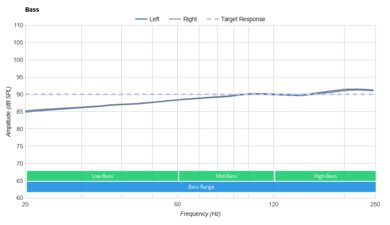
The Sennheiser CX Plus' bass accuracy is excellent. The low-bass is recessed, so tracks lack thump and rumble. However, the rest of the range is fairly flat and neutral, so mixes retain their body, warmth, and boom.

The mid accuracy is good. The low-mid is fairly neutral, but the rest of the range is underemphasized. As a result, vocals and lead instruments are present, although they're nudged to the back of your mixes and sound weak.
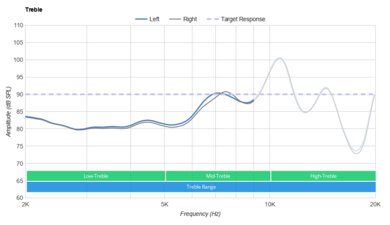
The treble accuracy of these in-ears is poor. It's underemphasized across the range, so vocals and lead instruments are very veiled and lack detail. Sibilants like S and T sounds are also dull and lispy.

The Sennheiser CX Plus' peaks and dips performance is good. A small peak between the high-bass and low-mid adds boom and clutter to your mixes, while a dip in the mid-mid nudges vocals and lead instruments to the back of your mix. A peak in the high-mid adds intensity to vocals and lead instruments, but a dip in the low-treble veils them and hurts their comprehensibility. A peak in the mid-treble makes sibilants like cymbals piercing.


The Sennheiser CX Plus have an outstanding imaging performance. The group delay falls below the audibility threshold, which results in tight bass and transparent treble reproduction. The L/R drivers are also well-matched in phase, amplitude, and frequency response, so objects like footsteps are accurately placed within the stereo image. However, our results are only valid for our unit, and yours may perform differently.
Like most truly wireless headphones, the Sennheiser CX Plus have a terrible passive soundstage. To create a wide and out-of-head soundstage, your outer ear needs to be activated by sound resonances. However, in-ear headphones bypass your outer ear, which results in sound seeming like it's coming from inside your head, and it doesn't sound very immersive.
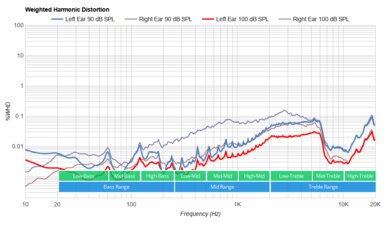
The Sennheiser CX Plus have a decent weighted harmonic distortion performance. The right driver is more prone to distortion, particularly at normal volumes, from the mid to treble ranges. It can be hard to hear with real-life content, though.
These are the settings used to test these headphones. Our results are only valid when using the headphones in this configuration.

The Sennheiser CX Plus' noise isolation performance is okay. Although we expected a better performance, our subjective listening experience matched our results. We also tried using different ear tip sizes, but this is the best result we could achieve. Even with their active noise cancelling (ANC) system turned on, they struggle to block out the low rumbles of bus and plane engine noise. They do a better job of reducing mid-range sound like ambient chatter, though, and can cut down high-pitched noise like the hum of an AC unit.
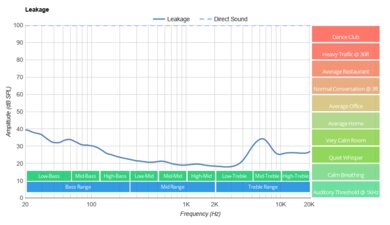
The Sennheiser CX Plus True Wireless' leakage performance is outstanding. Their leakage is low, so you can listen to your favorite audio at high volumes without disturbing those around you, even in quiet environments.
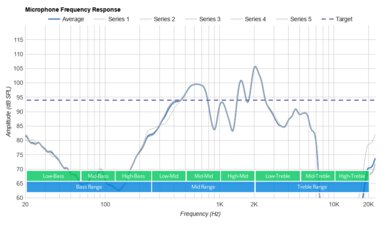
The recording quality of the Sennheiser CX Plus's mic is disappointing. Your voice sounds thin, muffled, and lacking in detail.
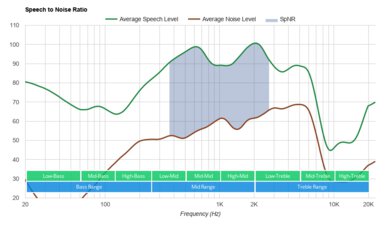
The integrated mic has an okay noise handling performance. The mic struggles to separate your voice from moderate ambient noise. While you shouldn't have any issues being understood clearly in a quiet environment, your voice may get drowned out by noise from a busy street.
The Sennheiser CX Plus True Wireless' battery life is decent. They're advertised to last eight hours continuously, and we measured just under seven hours. Their carrying case holds roughly two additional charges, and you can even use one bud while the other one charges. They're advertised to support a 10-minute quick charge, which delivers one hour of playtime, and they have an auto-off timer that you can adjust in their companion app. However, battery life can vary depending on usage, so your real-life experience may vary.
The Sennheiser Smart Control app is good. It has a graphic EQ and presets, meaning you can adjust the buds' sound to your liking. You can also create your own EQ presets. You can also turn on and off 'Transparent Hearing', ANC (in the device settings tab), and 'Smart Pause', which pauses your audio when you take the buds out of your ears. You can adjust the auto-off timer too and customize all the touch controls. However, if you remap some of the controls, you may lose some features.
The Sennheiser CX Plus have okay Bluetooth connectivity. They don't support NFC or multi-device pairing. They also have high latency on PCs, whether you're using SBC or aptX codecs. Luckily, their latency is a lot lower on iOS and Android devices, which is good if you like to stream videos. While these headphones support aptX Adaptive, this codec is only supported on select devices and we don't have access to them at the moment. However, we don't expect the frequency response to change if you're using this codec.
The Sennheiser CX Plus are fully compatible with Bluetooth-enabled PCs. However, they don't support a wired connection, so you can't connect to them in any other way.
The Sennheiser CX Plus come with a carrying case that has two additional charges. While it doesn't support wireless charging, you can recharge the case using the included USB-A to USB-C cable.






